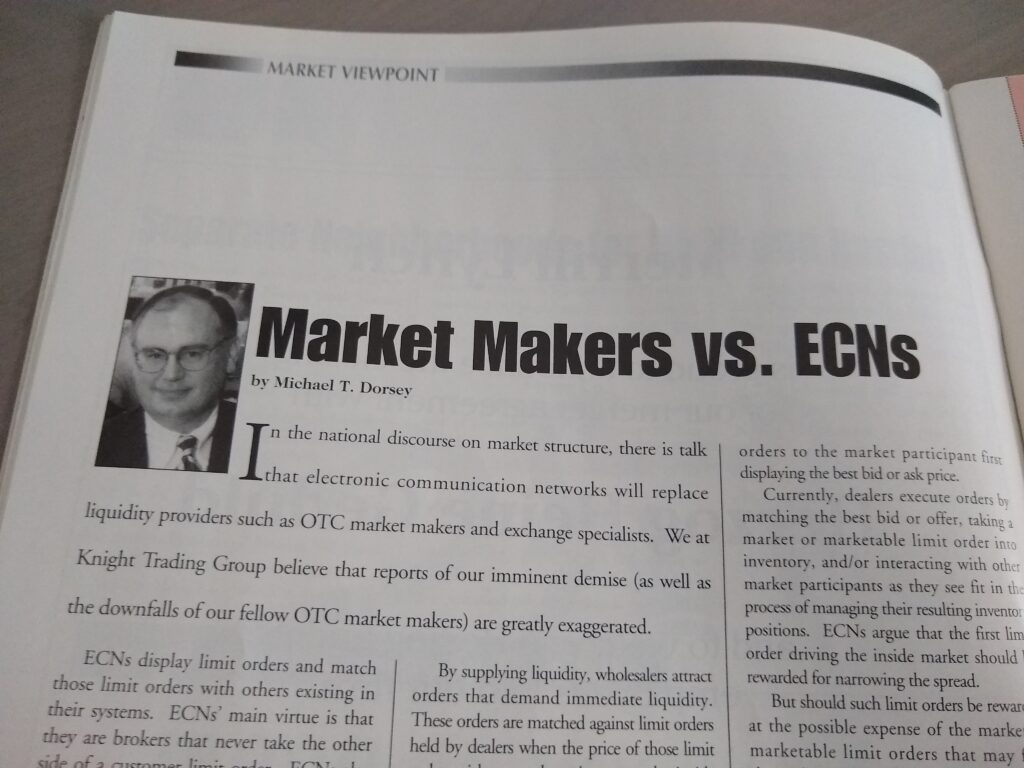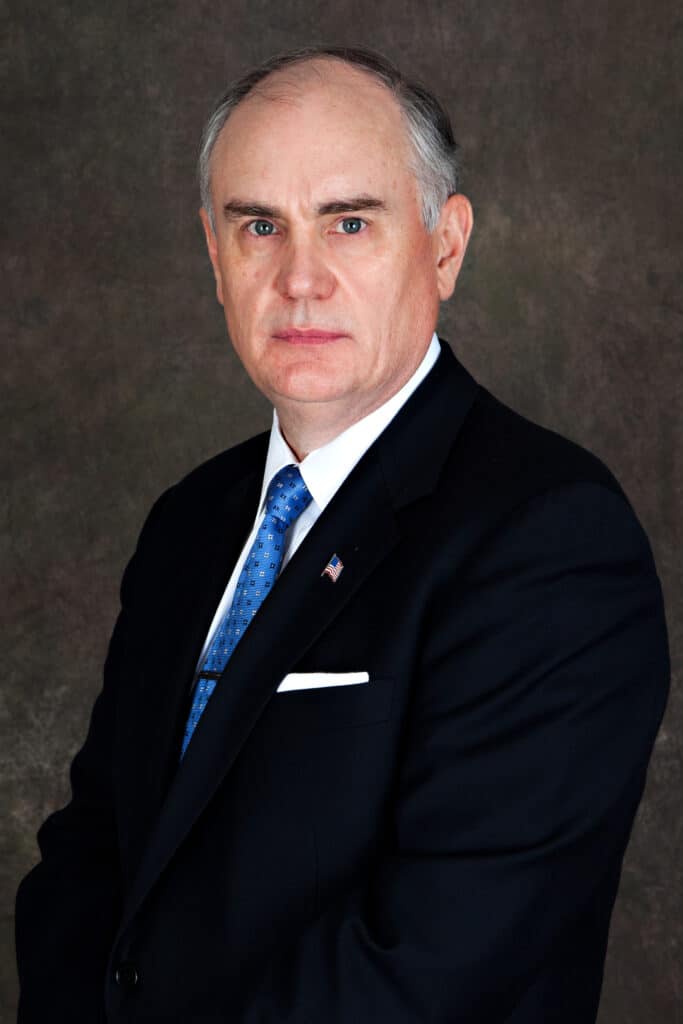FLASH FRIDAY is a weekly content series looking at the past, present and future of capital markets trading and technology. FLASH FRIDAY is sponsored by Instinet.
The October 2000 Traders Magazine included a Market Viewpoint written by Michael T. Dorsey, then general counsel and secretary at Knight Trading Group.

In the op-ed, Dorsey was skeptical on electronic communication networks. “We believe that the ECN business model will be the exception rather than the rule in the future,” he wrote. “To think otherwise is to underestimate the limitations inherent in the ECN business model.”
20.5 years later, Traders caught up with Dorsey, now an independent securities compliance consultant to securities firms and asset managers.
What is your current role/responsibilities?
I am a securities compliance consultant handling all the regulatory issues faced by broker-dealers and investment advisers. I emphasize trading and structural issues in the equities and fixed income markets. I also provide independent consultant services in regulatory actions as well as outsourcing CCO services to broker-dealers and investment advisers. These consulting relationships help position me as an integral part of my client’s organizational structure. For example, as a senior consultant with MCG Consulting, I am the Chief Compliance Office (CCO) of Redi Global, an equities routing unit within Refinitiv that has recently become part of the London Stock Exchange Group.
How has your career evolved since 2000, when you wrote “Market Makers vs. ECNs” in Traders Magazine?

My career continued principally in equity trading for several years at Knight and with senior roles at Crown Financial Group and OTC Markets Group (f/n/a The Pink Sheets). In time, I became associated with Annaly Capital Management as its Chief Compliance Officer to its broker-dealer and investment advisers. My association with Annaly brought me into the world of fixed income, specifically the trading of Government Sponsored Entities (GSEs) i.e., Ginnie Maes, Fannie Maes, and Freddie Mac securities. While at Annaly, I worked more extensively with repurchase/reverse repurchase agreements, stock lending, and rates trading. My association with Annaly ended a couple of years ago at which time I returned to my securities compliance consulting practice.
How do you excel/differentiate yourself as a consultant to broker-dealers and financial advisors?
In the consulting world, experience means everything. I started with the Securities and Exchange Commission (SEC) 35 years ago in the Division of Market Regulation (n/k/a Trading and Markets). After eight years there working on issues in Financial Responsibility, Trading Practices, Supervision, Listings, etc., I left for the financial services industry. Since then, I first worked with variable contracts and mutual funds before focusing heavily on the trading of equity and fixed income securities. My experiences in the securities industry are extensive and varied, and not typically found in law firms or accounting firms.
What are your clients’ main pain points currently, i.e., what are clients asking you for help with?
While trading issues are ever present, recent consultations have focused on AML/CIP. The SEC has become more aggressive on requiring suspicious activity reports (SARs). FINRA member firms in the business of microcap securities are particularly vulnerable to intense scrutiny by the SEC and FINRA. These regulators are readily sanctioning broker-dealers for not filing SARs. MCG just completed a review of the regulatory program focusing on the processing of microcap securities. We placed particular emphasis on internal controls, policies, and procedures within a business line having just a limited number of well-researched customers. Of course, as in all things regulatory, we stressed the need for the client to document reviews and preserve evidence within its enhanced due diligence program.
How has the financial services industry changed since 2000, from your perspective?
The financial service industry has changed greatly in the last 20 years, especially in equity trading and its related market structure. The electron race associated with equity trading has gone from fast to an extreme, virtually eliminating the human touch in all order executions. Since my article on Market Makers vs. ECNs, the marketplace has grown its use of and reliance on alternative trading systems (ATSs), a broader concept that ECNs. In 2000, those ATSs (brokers) were largely limited to ECNs which were useful tools for market makers (dealers) in their efforts to manage their securities inventories. Now the ATSs (brokers) find it useful to have market makers (dealers) as subscribers to supply the liquidity needed to draw additional order flow and trading into those ATS venues. The world certainly has turned where brokers are favored over dealers, yet dealers are the tools necessary to make those brokers effective.
What would be your advice to a young person who is just starting out in financial services?
I recommend someone starting out in the regulatory area of financial services industry to direct their careers into the field of asset management. The broker-dealer world has become more regulated over the years causing the number of firms to drop by nearly 50% in the last 25 years. Conversely the asset management world has grown with an explosion in the number of investment advisers and, more importantly, assets under management. The cost pressures on broker-dealers are enormous compared to those of investment advisers as the variability of broker-dealer revenue streams (transaction based) are far greater than those of investment advisers (asset based).
What are your plans for the future?
I am looking to expand my securities compliance practice with additional relationships and projects. Securities compliance consulting is wonderful. The scenery is always changing and so are the issues. Clients respect your experience and appreciate that you have walked more than a mile in their shoes. They readily accept your advice when you put that advice in the context of a real situation that you have faced in your career. Informed firms experience the advantages of consultants who know the firms’ businesses in the form of reduced headcount, costs, and regulatory risks.






